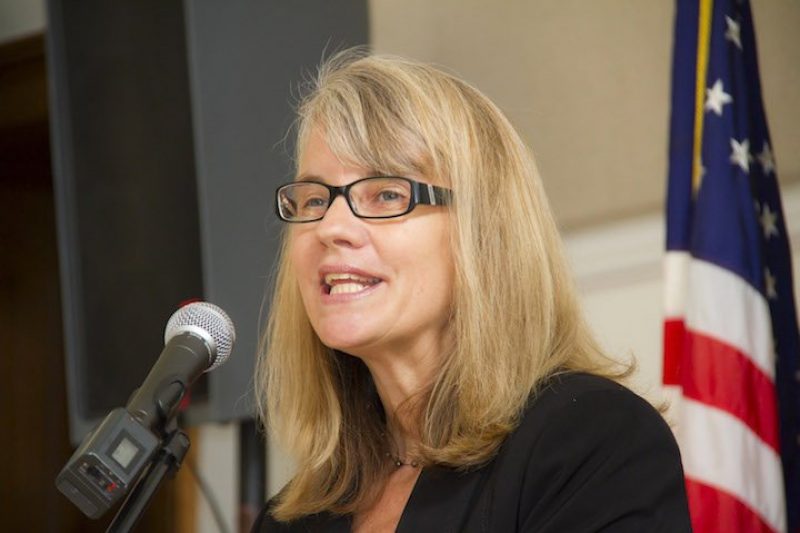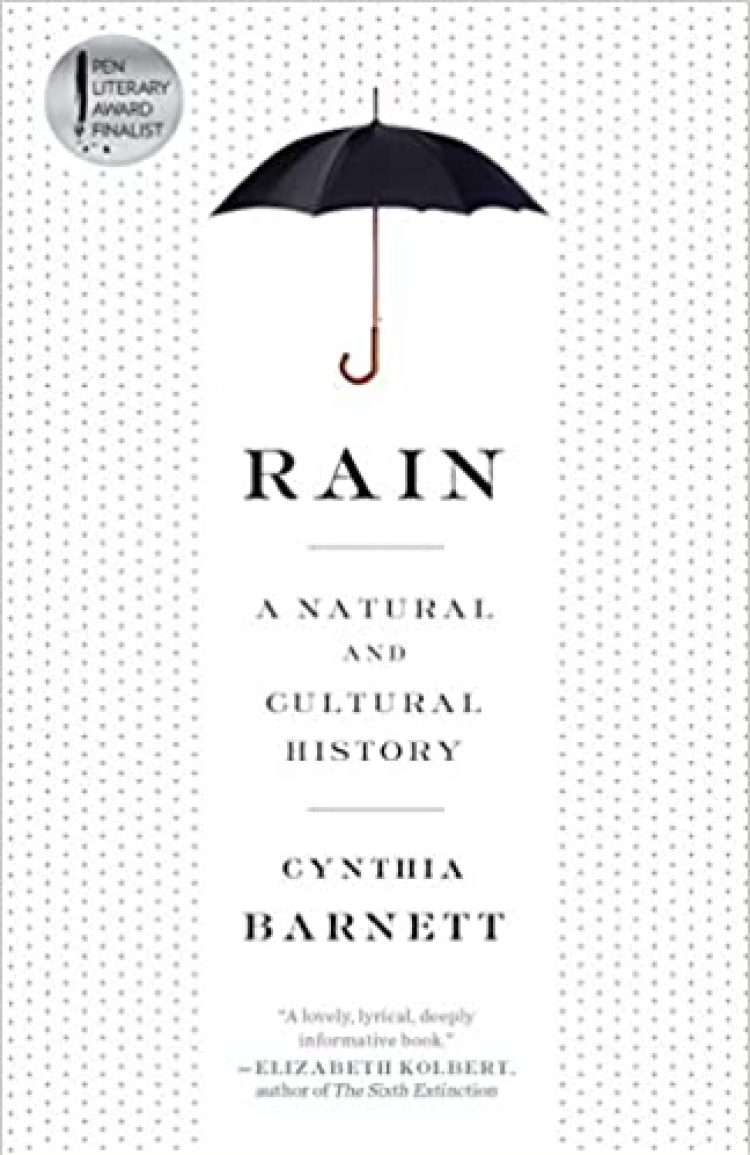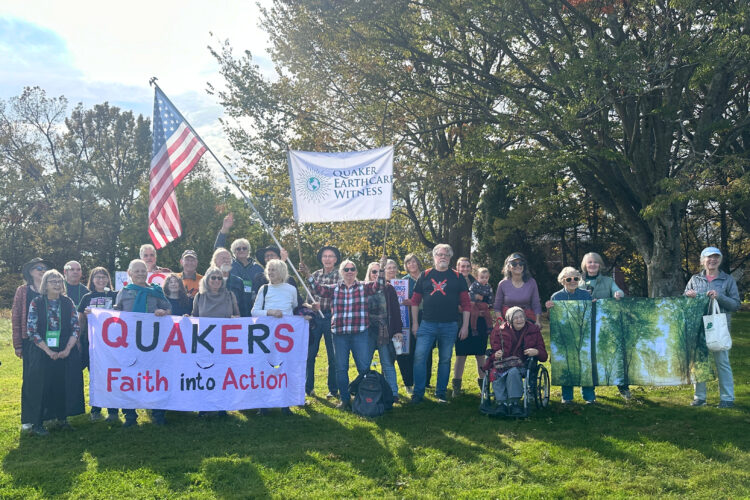Environmental Author Cynthia Barnett Talks to QEW

Cynthia Barnett, the author of three books focused on water: Rain: A Natural and Cultural History, Blue Revolution: Unmaking America’s Water Crisis, and Mirage: Florida and the Vanishing Water of the Eastern U.S., shares her insight on climate and water with QEW Publications Coordinator Hayley Hathaway.
You now have written three books on the subject of water. Why water?
Water was the sweet spot where a personal and professional passion lined up with a great societal need. I was a water-lover since childhood–the kid who had to be dragged from playing in the ocean, the pool, the bathtub, or even the rain. Then in my years as a journalist covering many different stories, water really began to stand out as this crucial resource whose future was decided by an extraordinarily small group making often questionable decisions: Why was that groundwater permit granted when the aquifer is already depleted? Why does that developer get to fill in the wetland? Sometimes a journalist gets obsessed, and that’s what happened with me and water.
Your first book, Mirage, was released in 2007. How has the landscape, literally and figuratively, changed since then?
Mirage foresaw this strange story of water scarcity in the American East, one of the most water-blessed regions in all the world. Like so many issues, we’ve made progress at the same time we’ve slid back. Americans are using less and less water overall, even amid population and economic growth. Yet we haven’t gotten better at taking care of our natural waters: laying off groundwater pumping, wetlands drainage, river diversions and the like.
How has your work influenced the response to the water crisis in your home state of Florida? Have you seen its impact beyond the state?
Mirage published at the right time, when people were already beginning to open their eyes to human-caused scarcity. The drought of 2007 had an enormous influence to help Floridians understand what I call “America’s illusion of water abundance.” In Florida and around the U.S. today, many more people and communities discuss water ethics. My continued frustration is that at the same time so many are engaged and living differently with water, some interest groups and elected officials continue to stand in the way of making water sustainability systematic.
You describe and call for a water ethic. Can you share what you mean and what we must do to get there?
At its most basic, a water ethic means living with water today in a way that doesn’t jeopardize fresh, clean water for future generations and ecosystems tomorrow. There are two straightforward ways to get there: using less and polluting less in all sectors of the economy.
As activists and people of faith with a deep concern for Earthcare, where can we look for inspiration and guidance?
Again, I take solace and faith from history. A half century ago, the United States cleaned up industrial pollution so severe that major rivers would burst into flame. We restored sewage-killed bays, their seagrass and fish. We stopped dam building in the American West–including the terrible idea of damming the Grand Canyon. And of course Quaker communities have done so much more than this; your work on Abolition is the perfect example of how a small group of people can beat the damaging dominant paradigm by appealing to morals, ethics and humanity. This will ultimately be the case with water and climate.
How do you respond to people who are not convinced that climate change is a threat?
This is about shared values. The key is moving the conversation out of the political realm and into a more unifying realm: future generations, quality of life, helping the poor, whatever common ground you can find. I find social media is hopeless when it comes to engaging people who have been co-opted by the deniers. Face-to-face conversations are best.
Another thing to remember is that only about 9% of Americans truly deny climate change. They are just the loudest, and they happen to be in charge at the moment!
What we see all over the country is that once your community has experienced the extreme rains, the heat, the sunny-day flooding, whatever it is, you want to roll up your sleeves and work on climate change.
Water Water Everywhere, but…” Review of Cynthia Barnett’s Books
By Brad Stocker.
SOMETIMES IT MAKES MORE SENSE to review an author than a book. This is the case with Cynthia Barnett, an environmental journalist who has spent years studying water. Rarely have I read more than one book of non-fiction by the same author. Now Cynthia Barnett falls into this small group alongside Thomas Barry, E.O. Wilson, and Bill Bryson. Ms. Barnett has written three books with the central theme of water running through them all: Rain: A Natural and Cultural History, Blue Revolution: Unmaking America’s Water Crisis, and Mirage: Florida and the Vanishing Water of the Eastern U.S. She does what many in science fields fail to do: she writes intriguing and interesting narratives about hard subjects in ways that non-scientists enjoy.
While Mirage specifies Florida in the title, it is important to notice that it also speaks to the entire eastern part of the U.S. Most of us are familiar with the droughts and water issues, even water wars, of the land west of the Mississippi, but are far less familiar with the same issues in the east. We have been fed the myth that there is an unlimited abundance of water in the east. That lie, as it has been for all other of Earth’s resources, has only recently come into full light. Do not be fooled into believing that this book is not relevant because you live outside of Florida. It uses the west’s water situation as models of what the east should and should not do.
Blue Revolution’s title invokes notions that many hold forth as essential to real and necessary change. Though Ms. Barnett’s blue revolution is a far softer one than some would wish, it is nevertheless one that deserves careful discernment. Not only does the book trace the history of water, power, and life as they are inextricably linked, it also highlights the need for a strong water ethic. She shows that where a bioregion has instituted a sound water ethic, there is a positive turnaround in the humans’ relationship to water.
I found that Rain is my favorite and the most entertaining. As always, she writes with knowledge and wit. The book is another look at humans’ connection to water through a primary source. As precipitation does, the stories within cross the false borders of political boundaries. She travels to the wettest town in the world at the edges of India to find it is suffering from climate change’s impact on its fame. She visits a location that is renowned for capturing the essential aroma of rain and discovers that aromas are very cultural and personal. The small tidbits of information she weaves craftily into the whole are in themselves fascinating but also serve well as conversation openers. The one I have taken to gatherings is that the image of a raindrop that we have become accustomed to seeing is contrary to reality. The thinner part of a real raindrop is at the bottom not the top.
I highly recommend Cynthia Barnett as an author who teaches without pain and in so doing invites us to learn more. Whether you read one or all of her books, I am sure that you will discover information and facts that are new to you and that you will have well spent your time.
Brad Stocker, Ed.D., an educator for many years, is currently most concerned with earthcare and earth literacy. His family is bilingual/bicultural and he and his wife, Tere Campos, write, play, and care for their elders and grandchildren.


